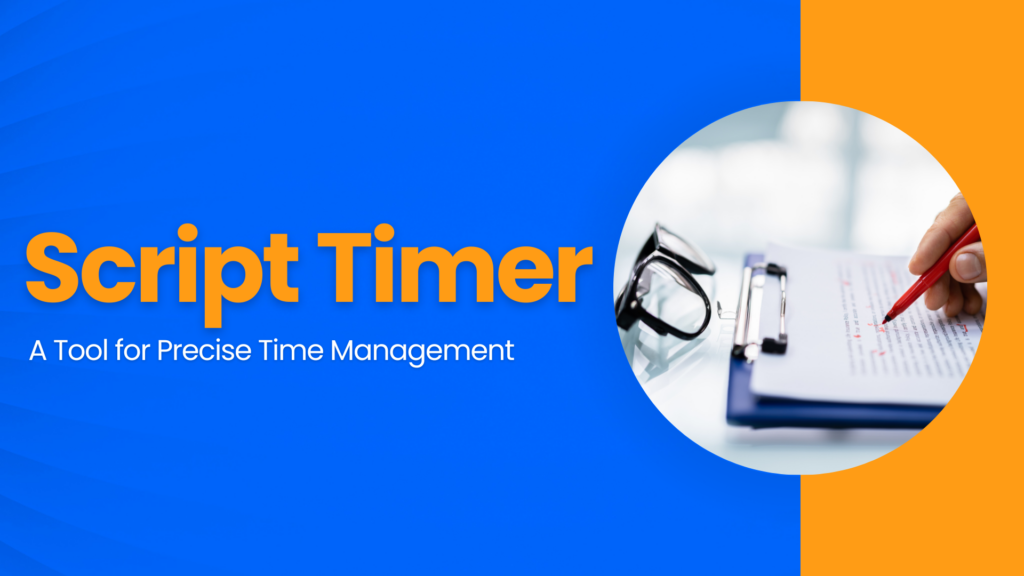As a scriptwriter, you know that time is of the essence when it comes to creating engaging and impactful content. The ability to stay focused is a critical component of achieving success in this industry. However, it can be challenging to remain on track when working on a long-form project like a movie or TV show. That’s where a script-timer comes in handy.
A script-timer is a tool that helps you manage your time while writing a script. It’s a digital or physical stopwatch that tracks the time you spend writing. With a script timer, you can set time limits for specific writing tasks, which helps you stay on track and avoid distractions.
One of the most challenging aspects of writing is staying focused. Whether you’re a professional writer or someone who writes as a hobby, it can be tough to stay on task and avoid distractions. However, with the help of a script-timer, you can stay focused on your writing goals and achieve success in your craft.
So, how do you use a script-timer to stay focused while writing a script? Let’s explore some tips and techniques.
1. Start with an Outline
Before you start writing, create an outline of your script. This will help you stay focused on the story and avoid getting bogged down in details. A script-timer can help you stick to your outline and make sure you’re hitting the important beats of your story.
When creating your outline, consider the key elements of your script, such as the characters, plot, and setting. Think about the structure of your script and how you want to convey your message to your audience. Once you have a solid outline, you can use your script timer to help you stay on track and make progress toward completing your script.
2. Set Realistic Goals
When using a script timer, it’s essential to set realistic goals for each writing session. If you’re new to using a timer, start with shorter writing sessions and work your way up to longer ones. Setting achievable goals will help you stay motivated and focused.
When setting your goals, consider your schedule and the amount of time you have available for writing. Think about the specific tasks you need to complete during each writing session, such as research, outlining, and actual writing. Use your script timer to track your progress and make sure you’re meeting your goals.
3. Take Breaks
Taking breaks is an important part of staying focused while writing. It’s essential to step away from your work regularly to rest your eyes and clear your mind. Use your script timer to schedule regular breaks during your writing sessions.
When taking a break, get up from your desk and do something that relaxes you. Take a walk, do some stretches, or simply sit outside and enjoy some fresh air. By taking regular breaks, you can recharge your batteries and return to your writing with renewed energy and focus.
4. Use Time Blocks
One of the best ways to stay focused when writing is to use time blocks. A time block is a set amount of time during which you focus on a specific task. Using a script timer to set time blocks for writing, research, and outlining can help you stay on task and avoid distractions.
When setting your time blocks, consider the specific tasks you need to complete and how much time you need to complete them. For example, you might set a time block of 30 minutes for research, followed by a time block of 60 minutes for writing. By using time blocks, you can make the most of your writing sessions and avoid getting sidetracked by other tasks.
5. Eliminate Distractions
Distractions are the enemy of focus when writing. To stay on track, eliminate as many distractions as possible. Turn off your phone, close unnecessary tabs on your computer, and let others know you’re working on a project that requires your undivided attention.
Another way to eliminate distractions is to create a dedicated writing space. Whether it’s a home office or a quiet corner in a coffee shop, having a designated space for writing can help you stay focused and avoid interruptions.
6. Staying Motivated
Staying motivated can be challenging when working on a long-form project like a script. Use your script timer to break your work into smaller, manageable tasks. This will help you stay motivated as you make progress toward completing your script.
When setting your goals, think about the specific tasks you need to complete to move your script forward. For example, you might set a goal to write a certain number of pages each day or complete a specific scene by the end of the week. By breaking your work into smaller tasks, you can stay motivated and focused on making progress toward your ultimate goal of completing your script.
Benefits of Using a Script-Timer
Using a script timer offers several benefits that can help you stay focused and productive while writing.
1. Better time management
By using a script timer, you can better manage your time and avoid getting sidetracked. This can help you make progress on your script and ultimately finish it faster.
2. Increased productivity
Staying focused and avoiding distractions can lead to increased productivity. You’ll be able to get more done in less time, which can help you meet tight deadlines.
Improved quality
Staying focused on the task at hand can lead to improved quality in your writing. You’ll be able to give each section of your script the attention it deserves, resulting in a higher-quality finished product.
Bottomline
Using a script timer is an essential tool that can help you stay focused and productive while writing a script. By following the tips and techniques outlined in this article, you can make the most of your writing sessions and produce high-quality work in less time.
If you’re looking to take your scriptwriting skills to the next level, consider downloading our free guide on “Learn to Write Amazing Scripts.” This comprehensive guide offers tips and advice from industry professionals to help you hone your craft and create compelling content.
Additionally, if you’re looking to bring your script to life, consider using Voice123 to find the perfect voice actor for your project. With a database of over 500,000 professional voice actors, you can find the right voice to bring your script to life and captivate your audience.





